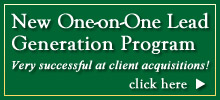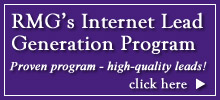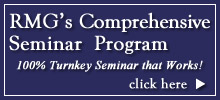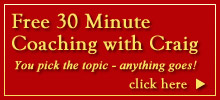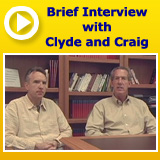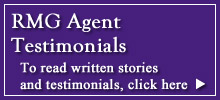Articles
Articles By Craig Randall:
Articles By Clyde Cleveland:
- What I have learned from the top seminar producers
- To Feed or Not to Feed?
- Card VS Wedding Style Invitations
- Becoming A Super Effective Speaker
- What Is Your Client Manifestation Ratio?
- How Top Producers DOUBLE Their August Sales.
- Dispelling Financial Seminar Myths
Successful Seminars: Converting in the "Red Zone"
By Craig L. Randall, MBA. CEO of Randall Marketing Group
President of Randall Wealth Management
The most successful NFL quarterbacks in the history of the game are the ones that consistently convert red zone opportunities into points. The same is true for financial professionals who do seminar selling. Seminars are a great source of new clients - but only if you can convert attendees to appointments.
Converting the seminar attendee to an appointment in a critical step in any seminar system, and if done successfully can deliver unprecedented growth in your financial practice, and help you achieve Johnny Unitas status among your peers.
The challenge of marketing yourself
When utilizing seminars to build a business there are several critical elements that must be mastered to achieve outstanding results. The most basic, but also one of the most challenging, is getting the attendees to ask for an appointment. Here's a suggestion for the best way to approach this sensitive issue without being overtly aggressive, which can be a major turn-off for attendees. Four key steps to a successful seminar presentation.
Step One
Before the seminar begins, each attendee should receive a worksheet. The worksheet must have three sections. The top section should be an area to write their name address and phone number. The middle section should be a list of items that may be important to them. For example, funding their children's education, or retiring comfortably in Florida, may be items that you would include on your list. Make sure the list is diverse and comprehensive, and leave a blank spot for them to include something that you may not have thought of.
You should instruct the attendees to check off any topic that is important to them. The third and final section should be an area for them to select a time and day for their appointment. This worksheet is going to be an important tool in setting appointments, as you will soon see.
Step Two
The second key to a successful seminar presentation is to have an entertaining and captivating PowerPoint presentation. Too many financial professionals are using technical and detailed presentations that simply aren't effective. A well designed seminar will have three main sections.
The first section must establish your credibility. This is accomplished by having a qualified assistant (by qualified, I mean someone who is comfortable speaking in front of people) do the first few slides, and introduce the main speaker by telling the group about the speaker's background and credentials. It's very important that when the assistant has completed the introduction and the speaker is making their way to the front of the room that the assistant start the applause. When you walk into the room full of potential clients and they are all applauding two things are happening. First, the applause will motivate you to put on a good show, and more importantly the group has accepted you and is excited about listening to what you have to say.

Step Three
The third section of the seminar is referred to as the shot-gun section. The purpose here is to cover as many different topics as briefly as possible, as quickly and briefly as possible. A good shot-gun section could include topics such as: annuities, mutual funds, asset allocation, IRA's, estate planning, life insurance and long term health care.
At this point in your presentation the objective must be to press as many buttons as you can. The attendees all have different interest and needs. When you hit a topic that's important to them the odds of setting an appointment increases dramatically. Your primary objective is to cover as much ground as possible in order to gain relevance with your attendees.
Note: remember to limit your "shot gun section" to content you are qualified and licensed to discuss, and to make sure to check any state's regulations to verify you are operating under the terms of your license.
Step Four
The fourth and final section is to grab their attention and focus on the benefits of doing business with you and motivating them to set an appointment. The benefits could be that you will review their accounts every six months, or you do everything one on one with them, and that everything is individualized for your clients. Once you get through this section you are ready to close the entire group, all at the same time.
There are several ways to set appointments with seminar attendees. The most effective is to close right now while they are still in the warm and fuzzy zone. At this point in the seminar process there should be several closing slides. When completing the closing section it's advisable to give them an offer that they can't refuse. A very effective offer is a 1 hour no obligation consultation. The most effective way to accomplish this is to describe the appointment process, and to emphasize that in the first appointment there will be no specific recommendations made and to leave there check book at home. At this point you simply tell them what to do and the first thing you tell them is when you are willing to see them.
A simple way to do this is to tell them you have cleared your schedule for the next 2 weeks and that you generally see your first appointment at 9:00 AM and your last at 4:00 PM . The next step is to tell them to complete the bottom portion of the worksheet and indicate which day and time would be convenient for them to come in for their no obligation consultation. It is also advisable to tell them that your assistant will pick up all the worksheets at this point and when they are all collected dinner will be served. This should give the attendees the impression that the worksheet is their dinner ticket and they have to turn it in.
Note: It cannot be made to seem that attendees must submit their personal information unless they are required to do so. Since this type of seminar is generally seen as the "first step" in the sales process, it must be clear to the audience that they are handing over their information for the purposes of insurance solicitation and that they will be contacted if they hand in this information.
After the assistant collects all the worksheets they can be organized and specific dates and times for their no obligation consultation can be established. Of course, not all attendees will complete this section, but with a little closing skill the assistant can assign them a date and time. When all the worksheets have been collected and organized the speaker can determine which people did not indicate a time and date for an appointment. At this point it is a good idea for the assistant to set appointments with the attendees that indicated a time and date on the worksheet and the speaker can talk with the attendees that did not indicate a time. The speaker should be looking for areas that might be of interest to the attendees making it easier for the assistant to set an appointment with them.
The national average for setting appointments with seminar attendees is around 40% of the buying units. With a little effort and a Johnny Unitas attitude you can achieve closing rates of around 75% to 80%, twice the national average. Done properly, seminars can set you apart from the pack and produce results you have only dreamed about.
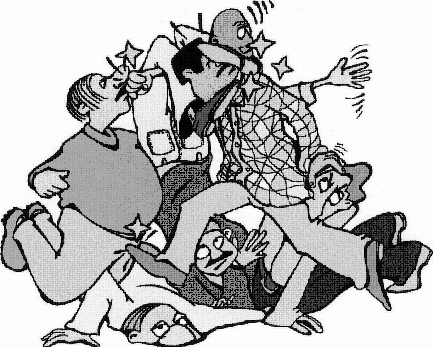
WHAT I HAVE LEARNED FROM THE TOP SEMINAR
PRODUCERS
By Clyde Cleveland, President of Randall Marketing Group
During the last year I have been blessed with the opportunity to work with several of the most successful seminar agents in the country. Valuable information comes to me every day about essential elements for success in annuity seminar selling. I am happy to share with you what I have found to be the most effective tools available, to help you attain the highest levels of achievement in this extraordinary business.
The Importance of Numbers
Let's say you and a friend are playing a game of coin flipping. You are calling heads and your friend is calling tails. When you flip the coin 50 times, odds are you are going to get heads 25 times. You will most likely win 25 times. Well, what do you have to do to win 50 times? It really is very simple, now get this, all you have to do is flip the coin 100 times! You will now win 50 times! You have just doubled the amount of wins!
I talk with about 80 annuity seminar agents every week. Some of them are extremely successful, making well over $1 million a year in commissions. The distinguishing difference between these top producers and advisors and all the others, is their attitude. These very successful agents have set up their businesses so that they see so many people they don't care if someone attends their seminar and eats their food with no intention of making an appointment. They are not concerned when someone doesn't show up for an appointment, and it is no big deal if someone cancels a sale. After experiencing this shift to a confident attitude, their whole perspective, mode of operating, confidence, personality, and life are changed.
How can this change in attitude affect your performance? You stop being a business "chaser". You become a business "magnet". You attract clients to you because they can sense that you don't "need" them. You naturally become more successful and you attract more success to you. You can become a magnet very easily. The first step is to set up your business so you are seeing so many people that you can barely handle the appointments. The best way to accomplish this is to use a very low-cost, simple and effective mailer, so that you can afford to send to as many people as you need, to double, or even triple your number of appointments.
Dramatically Increase Your Appointment Ratio
The top agents are getting 80% or more appointments at their seminars on a consistent basis. I won't be able to give you all that you will need in this brief article to attain this level, but I can share a few vital points with you. The top agents are setting appointments at the seminar. In fact they set the appointments before they serve any food.
The seminar must not be too detailed and the total focus must be on getting the appointment. Keeping it simple, and having a total system devoted to getting the appointment, is the common denominator of the most successful appointment setters.
The people must like you. That is the most important thing that you must accomplish. They want to be entertained and impressed with your knowledge. The main thing is that they become comfortable with you personally. They will not set an appointment with you if they do not like you.
To set appointments, all you need is a simple form that your attendees fill out as you are going through your seminar. If they are writing down information and checking boxes on the form throughout your presentation, they will be much more likely to fill out the appointment time on the form when you instruct them to do this at the end of your presentation.
Well-trained assistants will confirm appointments at the end of your presentation, while you are talking to those few people who have not scheduled an appointment. By the time you are ready to have the servers bring in the food, you will be reviewing your worksheets that should show about 80% or more appointment slots filled in!
Decreasing Your No-show Rate
The phone call to your RSVP list is your first opportunity to develop a relationship with the client! It is very important that this phone call is made in the appropriate manner.
Once a person has called in their reservation, there are three things you should do:
- Call them immediately upon receiving notification of their RSVP. Thank them for responding, and let them know that these seminars are extremely popular. Explain that because of the number of people attending, the restaurant needs to have advance notice of their meal choice. Then describe the meal choices and get a confirmation from them of their choice of meal.
- Now that they have made a commitment for a meal choice, they are much more likely to attend. Follow up with a simple letter or card confirming their meal choice, and providing directions to the seminar location.
- Make a friendly reminder call the day before the seminar to make sure they know how to get to the restaurant.
If you cannot get past the answering machine after several tries, leave a message. Say that you would appreciate it if they could call and confirm that they are coming, because these seminars are always full and there are people who would like their place if they cannot come.
If you follow this procedure you should significantly lower your no-show rate.
The Closing System
This is the most challenging part of the process for most agents. I know it was for me. Having the right system for you and your personality is absolutely critical. When I first started, I was using a one-call close. I am not suited for a one-call close and, even though I was closing, I was getting too many cancellations.
It is imperative that you find the right system for you and learn it so well that you are absolutely confident when you are with the client. There are several closing systems out there and seminars that teach particular systems. I have talked to hundreds of agents who have purchased every system out there, and it is now clear to me which systems are the most effective for the largest number of agents.
Conclusion
Extraordinary success in this business is attainable by almost anyone who is willing to apply themselves and use the techniques and systems that are working for thousands of agents all over the country. What kind of seminar to use, how to deliver the seminar, appointment setting strategy, and a selling system that works for you, are all essential components for maximum success.
One thing that has become clear to me in 34 years of business and selling is that if you focus on your customer's needs and achievements your own success will be assured. We have found that the key to our company's growth has been total focus on helping our clients achieve great results! I will end this article with a great quote from one of my all time favorite philosophers.
top
To
Feed or Not to Feed?
By Clyde Cleveland, President of Randall Marketing Group
I have helped over 400 seminar agents with their mailings over the past year and I still get this question. The vast majority of agents are using meals to attract potential customers to their seminars. There are still some agents, however, who do not feed and a few industry experts who do not recommend using meals. In this article I will tell you what our observations are on this issue and our opinion of what you should do based on our experience with thousands of seminar mailings.
Occasionally I have agents call me just after a seminar where they paid a $2,500 food bill and were only able to make 3 appointments. The standard comment is "These people were only there for the food". Then, as I listen patiently, the agent will launch into a long and emotional explanation about how the industry has reached a saturation point. Their logic is basically that there are so many agents out there mailing to the same people that virtually all the attendees are just coming for the free food and are not at all interested in what the agent has to say.
The conclusion that these agents arrive at is that they should stop feeding people and then only those who are truly interested in listening to the agent will attend the seminar. Then, these people, who only came to hear the agent's message, will be anxious to make an appointment and hand over their money to the agent.
Here is the problem with that logic. Our statistics show that seminar mailings, where a meal is provided, result in an average 1.0% response rate. Seminars held at the right restaurant can result in response rates over 2%, or even more than 3%. Mailings, where no meal is offered, result in an average 0.25% response rate. When you include the cost of meals you invariably end up with a LOWER cost per person in the room when you offer a meal. It may seem counterintuitive but in most cases the more you pay for the meal the lower your cost per person in the room.
For example; let's say you mail 7,500 pieces for $2,500.00, you have 75 people in attendance and you pay $20.00 per meal. You have paid $1,500.00 for your meals and a total of $4,000.00 for your meals and mailing. Your cost per person in the room is $4,000.00 divided by 75, or $53.00. The non-feeder sends out the same 7,500 mailing which costs him $2,500.00 and he gets .25 % or 18 people in the room. His cost is $2,500 divided by 18 or $138.00 per person in the room.
This phenomenon will occur almost every time in mature markets where there is a great deal of competition. In many cases the discrepancy will be even more pronounced. In some cases it will not be as extreme. Rural areas and markets that have less competition for seminars will obviously allow non-feeders more of a possibility to operate economically.
Some agents believe that the appointment ratio and ultimate closing ratio will be higher at non-feeding seminars because those people who "just came for the food" will never buy from you. Our observation is that the appointment ratio and closing ratio have no direct correlation to whether you feed or don't feed. The only factor involved in appointment ratios and closing ratios is the ability of the agent. This is confirmed over and over again by the top agents in the business who consistently get 80% appointment ratios and higher at seminars where they have purchased meals for their attendees, even at very expensive restaurants. Think about it this way, if they like you and trust you they will make an appointment with you, whether you feed them is not relevant. If they never meet you how can they know if they like you? You have to attract them to your seminar so you can have the opportunity to get the appointment.
Our conclusion on this issue is very clear. You will see more people if you feed and you're marketing dollars will be used more efficiently. You will make more appointments if you see more people, and you will make more money if you have more appointments. Assuming you have the right restaurant and are using an effective mailing system to bring in the attendees the next step is to improve your speaking skills and your closing skills. Call me anytime for tips on which trainers and boot camps are most highly appreciated by the most successful agents.
As far as restaurant strategy goes ask your senior clients which restaurants they love the most and you will be able to create a list of the restaurants that will draw best for you. We can say unequivocally, after 3 years of experience with our mailing system, that the restaurant is the primary factor determining the response rate you will receive from your mailings. This is the most important decision you will make regarding your marketing strategy.
top
"Card" vs. "Wedding" Style Invitations
By Clyde Cleveland, President of Randall Marketing Group
Two years ago a very successful annuity seminar agent began aggressively recruiting me to the seminar business. I was very impressed by his achievements and I began to show some interest in the business. He knew I had the financial planning and investment experience as well as many years of public speaking behind me. What he did not know was that I also had been the co-founder of two successful direct marketing companies that had been extensively involved in direct mail campaigns.
After observing this man's seminars and operations it became obvious to me that success, in this multi-faceted business, required a mix of different abilities. The ability to speak effectively was important, extensive investment knowledge and expertise was clearly necessary, ability to close was essential, and the final critical component was getting people to the seminars in the most cost effective manner possible. In other words, direct marketing knowledge was also necessary.
When I finally decided to get involved, it was under a contract where the company paid for my mailings and I paid for my meals and all other expenses. In return for my training and mailing costs being covered, I gave up a portion of my street level commissions. I did not see the mailer the company was using until I had already signed the contract. Once I saw their mailer, I wanted to call my attorney and have him cancel my contract!
The mailer they showed me was a simple over-sized post card with very little information. Everything I was accustomed to in direct mail was much more sophisticated, complex, and professional in appearance. I told them that I was extremely skeptical and wanted to rethink our deal now that I had seen their mail piece. We finally worked out a compromise. Basically I would give their mailer a chance for three seminars, and if I was not totally satisfied with the results they would pay for whatever competitive mailing piece I wanted to use without changing our deal in any way.
I have to say that, at this point, I was very surprised this agency had reached the absolute top of the industry with their simple mailer. However, since they had agreed to use any mailer I chose after the first three seminars, I focused on learning my seminar and getting my office set for business. I did, however, start to collect marketing materials from all the direct mail companies that were specializing in senior annuity seminar mailings. In my mind, there was no doubt that after the first three seminars I would be switching to one of those "professional direct mail" companies.
Three weeks later I gave my first seminar. Only 2,000 mailers had been sent out and there were 35 people in the room! I made 12 appointments, which was 75% of the buying units in the room. I wrote $410,000 in premium from that seminar. My next seminar had 30, again with 2,000 mailers, and the third seminar was about the same.
I never brought up the issue of changing mailers again!
Over the next few months, I conducted informal surveys among my clients about the mailers they were receiving from my competitors. I wanted to know why they had come to my seminar. I wanted to know what it was that made them respond to our simple mailer and why they did not respond to the more sophisticated and expensive mailing pieces. I also wanted to see if it was less sophisticated (and less wealthy) prospects that were responding to my mailer.
The company I was affiliated with had two years of experience with card style mailers. I did 28 seminars of my own with this mailer and conducted extensive surveys of my clients. Based on this experience I have made the following conclusions about mail pieces for the annuity seminar industry:
- You can totally forget about the big envelopes with coupons, etc. The wedding style invitations are a waste of money!
- The less your mailer looks like a professionally produced promotional piece the more effective it will be. In other words avoid glossy card stock and multi-colored printing.
- Keep the wording to a minimum. The beauty of the postcard mailer is its simplicity. You don't want to cram it with words.
- Don't make it sound as though your seminar is going to be difficult to understand. Avoid terms like "a mathematical model for investing will be presented".
- Emphasize the free meal and find good restaurants that attract the type of person you want as your client. The people who are doing the most annuity business in this country are using the higher quality restaurants.
- Do not use bulk mail; it is too risky for this business. If your card mailer is small enough you can get the first class rate for postcards.
- Always put your company's address as the return address. Most direct mail companies will not do this for you.
Note: For industry compliance reasons, the mailer must clearly disclose that it is from an insurance agent and is for insurance sales purposes.
To summarize, my experience over the last two years has proven to me that my initial negative reaction to the simple card mailer was totally unfounded. My more sophisticated (and more wealthy clients) continue to tell me that they are turned off by the obvious promotional direct mail pieces. They are especially turned off by the pieces that try to look like express mail or something other than what they really are.
They tell me that they are much more likely to respond to a simple card mailer that does nothing but communicate the necessary information in a simple and honest manner that they can understand. They seem to appreciate the straightforward manner of the card mailer, which is doing nothing more than providing them information about an event that they may want to attend.
Agents that use the simple card mailers can make a choice: they can take the money that they are saving and spend it on more mailers and earn twice as much money, or they can keep sending out the same amount of mailers and cut their mailing budget in half. They can then take the savings, or the extra earnings, to the bank at the end of the year! Or, I guess they could take it to the Mercedes dealer, or BMW dealer, or their child's college fund, or...
top
Becoming a Super Effective Speaker
By Clyde Cleveland, President of Randall Marketing Group
I have been a professional speaker since 1972. I have read books about speaking, listened to tapes, watched great speakers, and most significantly, been forced to improve my speaking abilities or not be able to feed my family. In December of 2002 I gave my first annuity seminar in West Des Moines, Iowa. I had 26 people in the room and 16 buying units. I was able to obtain 12 appointments from that very first seminar. My mentor in the business could not believe that I could achieve those results in my first presentation. He knew that I had never given the presentation before and never sold an annuity in my life.
Is it because I am a born speaker? I don't think so! I almost threw up the first time I had to speak in front of an audience and was so nervous I almost did not leave the bathroom. By the time I was done with that first presentation I couldn't wait to get home. I took off my sport coat and peeled off my sopping wet shirt. I was so scared that I was literally drenched with perspiration. Now at 54 years old I can't wait to get in front of my audience. It becomes an addiction when you learn a few basic principles that I will share with you in this article. I will also give you the most important piece of advice about speaking and improving your performance at your seminars that you will ever hear.
The first thing you have to do is get very comfortable with the material you are presenting. Most agents will not have a problem with this because they are probably in the business and are very familiar with the material.
The next issue is gearing your material to the audience. If you are talking to retirees or potential retirees you are going to have a wide diversity of experience and knowledge in your audience. Keep it simple and keep it interesting. And keep it fun! I find that humor is an absolute key ingredient in these senior seminars. They want to be entertained and have fun while they hopefully learn something of value. I tweaked and tweaked my seminar until I had the perfect blend of knowledge and humor. We want them to appreciate the knowledge we have given them, but they must feel that we are exceptionally competent and knowledgeable or they will not make an appointment with us. They will never make an appointment with us if they don't like us! Humor and warmth will be more important than the content!
If they do not like you as a person they will probably not make an appointment, and even if they do, they will not buy from you. So keep it simple, have a lot of humor, handle questions with grace and patience, and make them feel that all their questions are valuable and that there is no such thing as a stupid question. For an experienced speaker I recommend taking questions throughout the presentation.
Now for the most important piece of knowledge that I can share with you to make you the most effective speaker you can possibly be. You must videotape your presentations and review the presentation every time you speak for the first 5 or 6 times you give a new presentation. If you are speaking every week you may only have time to view a tape once a month, but the more you do it the better you will get. I don't care how long you have been speaking. Just watch yourself and take notes on what you need to do to improve your performance the next time you speak. You will not believe how quickly you will improve! I don't care how busy you get; you need to do this at least once a month. If you do, you will continue to increase your appointment percentages and increase your closing percentages. As every experienced producer knows, you start the close at the beginning of the seminar!
top
What Is Your Client Manifestation Ratio?
By Clyde Cleveland, President of Randall Marketing Group
Over the past two years I have written six articles on various aspects of the seminar process for ProducersWeb. In those articles I have focused on the first three phases of the successful seminar process: 1) filling the room, 2) the seminar presentation, and 3) the appointment-setting process. In this article I will focus on the fourth and final phase, which I call the client manifestation process.
You may have noticed that I did not call this fourth phase "closing the sale" or "making the sale" or any other term that indicates that we are somehow selling the client or otherwise convincing the client to do business with us. This choice of wording is crucial, because as long as we view ourselves as salespeople, we will create stress for our clients and ourselves. We will reduce our effectiveness, limit our ability to help people, and ultimately make less money and probably have a shorter life span.
Much of the knowledge I am going to share with you I have learned over the last year through my relationship with Craig Randall, one of the most effective teachers of financial service professionals in the history of our industry. One thing I know for sure; he is the most successful trainer I have seen in the 32 years I have been a financial service professional.
I have attended nine introductory and advanced sessions that Craig has taught over the last year. I can tell you that the transformation that takes place at these events and the few months that follow is absolutely amazing. The most incredible part of this transformation occurs at the end of the advanced program, when the agent realizes that he/she is no longer an agent or a "salesperson," but is in fact a "financial doctor." A doctor has absolute credibility with his patients. People ask the doctor what to do and then they do it. A salesperson, on the other hand, has to convince the potential client to do something and must overcome their objections. The first step in this transformation process is to realize that you are a trusted financial professional, because if you don't see yourself that way, it will be impossible to act that way. You also establish yourself as a trusted financial professional by sharing your credentials and showing your knowledge and mastery of your financial products.
Most sales training I have seen attempts to teach techniques for you to "master" (memorize) and use during the appointment so you can reduce the confrontational aspect of the session with your clients. These methods are not easy to learn, require a lot of work, and really aren't effective for most people until they actually become very successful. This is because these methods are actually trying to create an attitude within you that you really are not trying to get the client to do anything and that you are not concerned about getting their money so you can make a commission: This all amounts to mood-making if you really are concerned about making the sale.
On the other hand, if you have someone waiting to see you every hour on the hour, and you see your full appointment book every day when you come to your office, it creates a different psychology within you that carries over into your interactions with your clients. It creates, in actuality, the exact attitude that all the different sales training methods attempt to create through various psychological techniques. To become a skilled and successful financial professional presenter, you must first gain mastery of the initial three steps of the seminar process outlined in the first paragraph, so that your appointment book is always full (see previous articles). Then you will not have to create a mood of being unconcerned about "making the sale."
The second step to becoming a skilled and successful financial professional presenter is to establish the beginning of a long-term relationship with the client based on trust and confidence in your ability. You must get to know the client very well and gain full knowledge of their situation. You never want to mention or even think about a specific product, or take money form your client, in either of your first two meetings. (You should, however, advise your client that you offer insurance products which they may be interested in as a part of their financial strategy.) This takes practice, determination and discipline on your part. The focus of the first meeting is to get to know the client, and for him to get to know you. If you do this correctly, he will be happy to leave with you the financial information he brought to the first meeting. At the end of the first meeting you tell him that you will do some research on his situation to see if there are issues that need to be addressed.
The second meeting is all about discussing the deficiencies within his financial situation, and to do this in a manner that gives him the confidence that you are extremely knowledgeable. Some of the issues will be obvious, and you will have mentioned them at the first meeting. You do not have to criticize previous agents or brokers if you do this correctly. It actually increases your credibility if you do not criticize others in this process.
By the end of the second meeting you will have discovered the issues that need repair in a manner that is very obvious to the client. When you ask him at the end of the second meeting if he would like you to help by offering strategies, he will inevitably say yes. You then set a third appointment for two or three days later to show him the results of your research, and to complete the paperwork necessary in order to fix the most glaring issue you uncovered. Immediately after the third appointment, set a fourth appointment to fix any additional issues. All appointments are always less than one hour - remember, you have someone waiting in your lobby every hour.
To summarize, the keys to great success are 1) Your own belief that you do not "need" to do business with the client, 2) Your sincere commitment to doing the absolute best for your client no matter how much you make in the process, and 3) Your ability to see yourself as a skilled financial professional providing advice rather than an agent or salesperson.
top
How Top Producers DOUBLE Their August Sales
By Clyde Cleveland, President of Randall Marketing Group
I hear so many excuses about why you can't make money doing seminars in the summer. For two years now we have tracked our response rates and we mail out about 2 million mailers a month for seminar agents. Guess what we found? A drop in response rates in July and August that is barely discernable!
First, I am hoping to convince you to avoid making the same terrible mistake that many agents make during the summer months. Maybe you took last summer off, or just "cruised" through it because you heard that summers are a bad time for business in this industry? I am writing you to tell you nothing is further from the truth! Top annuity producers do NOT take summers off, because they know their competition is lazy during the summer months.
What if you could do as much business during July and August as you do during any other month of the year? Would you take the summer off then? We watched very carefully when we ran our "summer special" last year, and though we witnessed a reduced number of agents giving seminars in the summer, we noticed there was no consistent reduction in response rates last summer. What does this mean to you? It means that while other agents are making the assumption that summers are a waste of time, and retirees are too busy to attend, the top agents used this opportunity to pull ahead of the pack and earn more money than they ever had before.
What you do this summer could determine if this will be your best year yet. Consider the following: First, almost all your competition is on vacation! But just because other agents are on vacation, that does not mean your prospects are. Though some retirees take vacations in the summer, it is obviously not enough to produce a negative impact on response rates, as we discovered last summer. The bottom line is, while your competition is on vacation you could be setting records!
Second, more people come to seminars due to the good weather. Let's face it; the heat of the summer is no barrier in comparison to the snowstorms of winter or the dangerous thunderstorms of spring. Besides, retirees and potential retirees know the fine restaurant you are inviting them to is air-conditioned!
Third, what better way to save money and break all your volume records than with a cost-effective, simple invitation that will save you thousands of dollars? As I explained in my previous Producers Web article "Wedding Style vs. Card Style invitations" you can purchase postcards economically in high volumes, and if you haven't already noticed. it's a numbers game.
Remember the summer is your friend; please don't make the mistake of taking off a big block of time in the summer. I will offer one more compelling reason to work through the summer. We all know how long it takes to get back into your rhythm after a long lay off. Being a successful seminar agent is like being a professional athlete. You have to keep yourself in condition for top performance and when you take time off you get rusty. You then have to work twice as hard to regain your skills and your confidence. My suggestion is to make a deal with your spouse; only one or two weeks off during the summer and you promise that you will take three weeks off at Christmas!
top
Dispelling Financial Seminar Myths
By Clyde Cleveland, President of Randall Marketing Group
Why do the top producers write so much business? Ask a few of them and you will see: They aren't concerned with a few people showing up just for the free meals. Top producers don't even acknowledge what a "plate-licker" is, because they are too focused on results. Also, many agents we have talked with have reported that they have had these individuals attend several times, and it has paid off in spades! One agent in particular told us he let someone attend three times, and on the third time they brought their neighbor along who had a half-million dollar portfolio!
Over the last year we have tracked the results of over 1500 mailings for agents just like you. In doing so, we have been able to dispel some myths about the industry and find out what really does, and does not, work well with our style of invitation. Keep in mind that we are aware many of you have paid exorbitant prices for the standard wedding style invitation that has plagued the industry for so long. Some of the things I am about to reveal to you may not pertain to wedding style invitations, but I guarantee they do apply to card-style invitations:
DON'T
Fail to Feed.
Dollar for dollar, lead for lead, you are wasting your money if you fail to feed!
DON'T
Use golf clubs, country clubs, hotels and motels.
90% of our poor results are at these types of facilities.
DON'T
Serve refreshments only.
"Refreshments" means Styrofoam cups and stale cookies. AVOID this word!
DON'T
Fail to advertise the free "Gourmet" meal properly.
Some people may not consider the Olive Garden "Gourmet" but you know what, it's
all relative. If you can reasonably use this word use it, it works.
DON'T
Advertise a website.
Why should they go to your seminar if they can see what you offer on your website?
This is a BIG mistake!
DON'T
Use a bunch of fancy graphics.
Stick to a restaurant logo and it may improve results- but the more promotional
and main-stream your invitation looks the less it will pull.
DON'T
Print your invitation in all-caps.
THIS IS THE BEST WAY WE KNOW OF TO INSULT THE CUSTOMER'S INTELLIGENCE.
DON'T
Use the word "complimentary" or the word "refreshments" in place of "gourmet".
Psychologically, "complimentary" is perceived by many people as a little trinket
or gimmick that has very little real value. is that what you are offering?
DON'T
Advertise too many seminar dates on one invitation.
Why should they call now if they see you are doing 6 seminars in this month alone?
Two dates is fine for mailings up to 7500, three for larger mailings. You can
always add an overflow date if you fill up quickly.
DO
Offer dinner at a high-quality restaurant where you know retirees frequent.
If you want to catch fish, use the right bait, it's that simple!
DO
Advertise Free Gourmet Dinner at least two times on seminar side and one time
on address side. We are still trying to determine if it is even possible to
oversell the free gourmet dinner, it does not look that way.
DO
Focus your bullet points on the benefits of attending; use phrases like "no obligation" and "leave
your checkbook at home".
Only use negative bullet points, if followed up by the positive solution you
offer.
DO
Disclose that insurance products may be offered for sale. Check each states requirements for disclosures. Some require specific language.
What if you are following these principles already, are happy with your response rate, but you still want to know how to cut your advertising costs in half? Very simple: mail in high volumes and double your appointment setting skills. Mailing in high volume will allow you to pay as little as 29.9 cents per mailer! And to improve your appointment setting, call me and I will give you a powerful CD that has helped hundreds of agents dramatically increase their appointment ratios. The appointment setting system is the main part of the entire seminar selling process that most people simply do not have.
The information in this article will help you increase your response rates every time you mail. Remember, it all starts with a room full of people!
top
